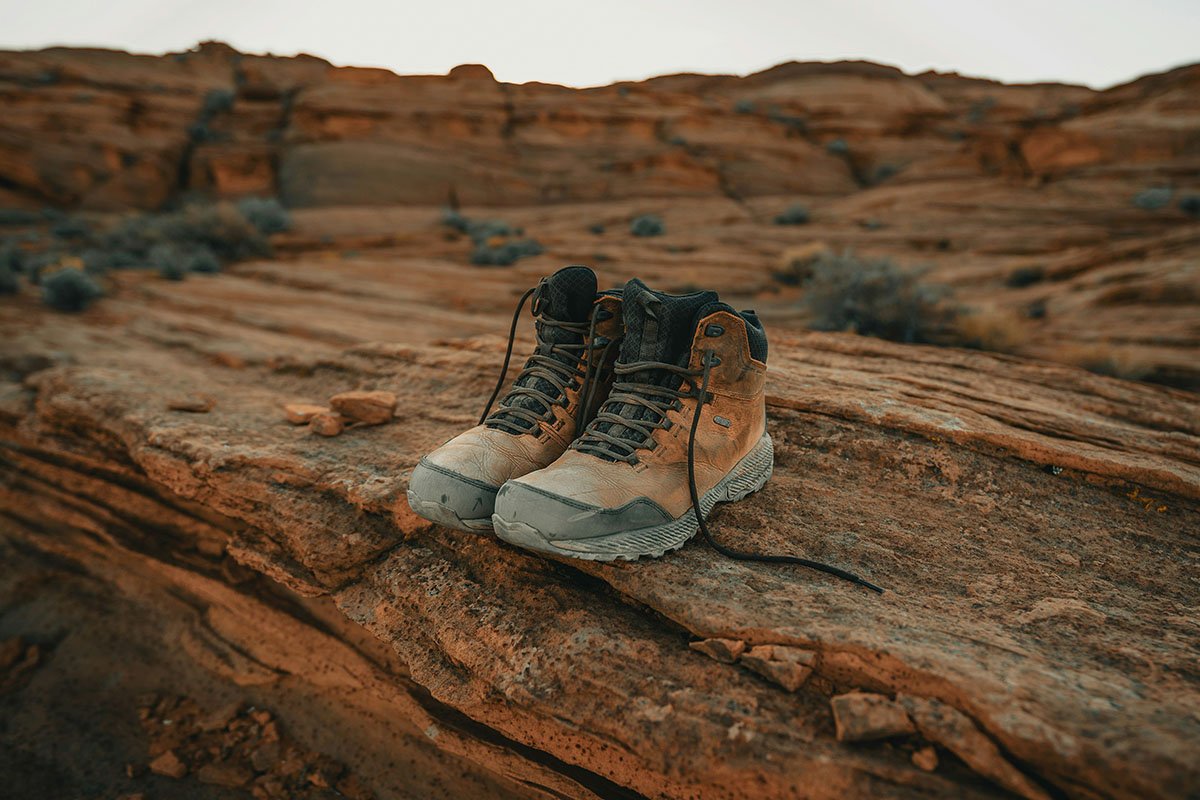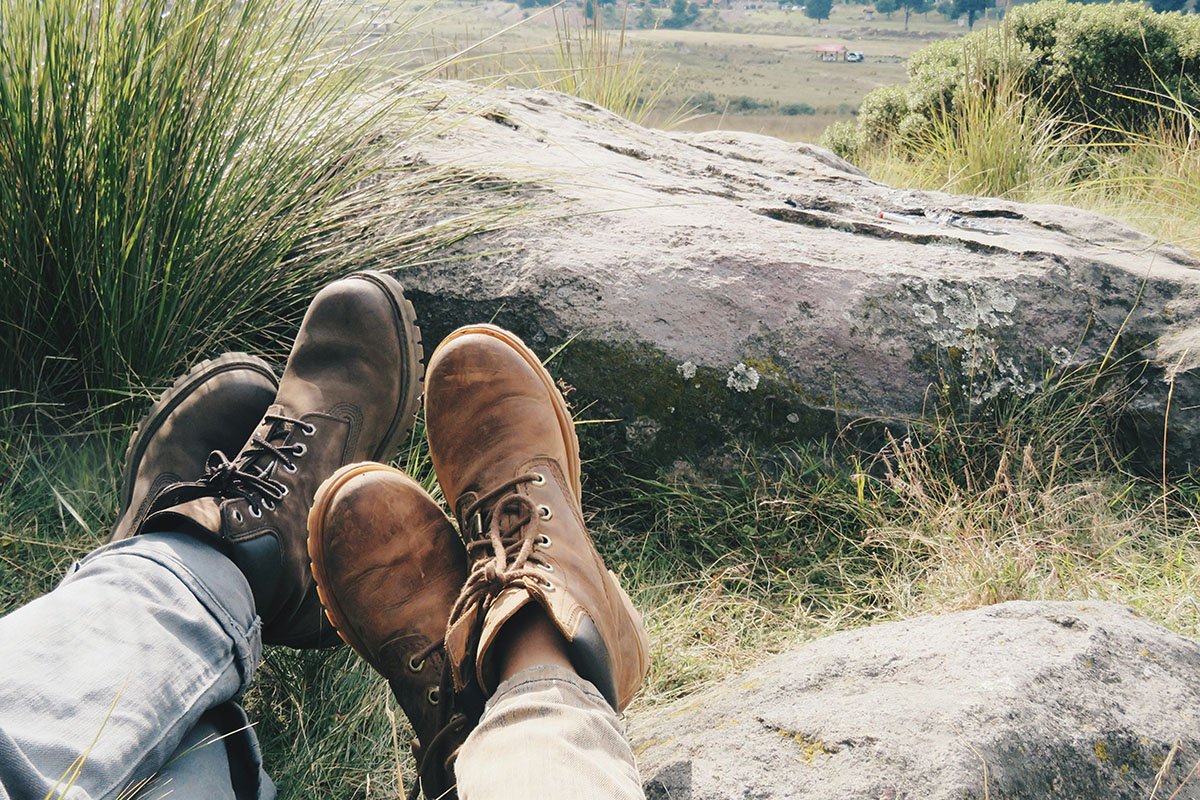

The difference between a hiking boot and a hiking shoe is that one is a boot and the other is a shoe. Thank you, goodnight! Wait, you want a more substantive answer? Alright. I guess I can do that. I’ll assume that if you’ve read this far — well, I’ll just go ahead and start.
Besides stating the obvious, if you’re shopping for new hiking footwear, the differences between hiking boots and hiking shoes are primarily preference and scenario-based. Both have their pros and cons, which is why in this article we’ll walk you through the differences to show which is better for when and where.
Hiking Boots vs Shoes

Whether you’re planning a short or a long hike, it’s helpful to wear footwear designed for the trail and environment. Whether they are hiking boots or hiking shoes, they will offer more protection and comfort as you walk along rough terrain than if you just wear shoes.
Hiking boots and hiking shoes have numerous overlapping design features, including thick soles with deep lugs for traction, durable construction material like Gore-Tex so your feet have extra protection against rocky terrain and wet conditions, and extra support and protection for long hikes and carrying a heavy load.
As I suggested in my opening sentence, the main difference between the two is ankle support. Hiking boots have a higher cuff than hiking shoes, so they go above your ankle. The high cuff limits mobility but for a good reason.
You might want extra ankle support for any number of reasons. Maybe you used to do activities that were hard on your ankles like skateboarding or dancing. No matter the reason, hiking boots limit the mobility of your ankle so it doesn’t twist or turn in a weird way and instead, only allow it to move up and down in a safe and healthy manner.
Conversely, hiking shoes have little to no ankle support, so your ankle will have greater mobility. Mobility is important if you’re hiking or backpacking through technical terrain where you’ll need to, for example, scramble over rocks or if you plan on walking at an accelerated pace as they do while ultralight backpacking.
The Best Hiking Boots & Shoes
- Hiking Boots: Merrell Moab Speed 2 Mid GTX Hiking Boots
- Hiking Shoes: Xero Shoes Scrambler Low Hiking Shoes
When to Wear Boots or Shoes

Are boots or shoes better for long hikes?
If you don’t have any ankle issues, the answer depends on your distance and load. If you’re day hiking or you’re carrying a lighter-weight pack, a pair of hiking shoes or even trail runners would be fine.
But if you’re planning to hike something like the Continental Divide Trail with a heavy load, then you’ll probably extra protection and support, so we’d suggest hiking boots.
Do hiking boots or hiking shoes require a break-in period?
Whether it’s a hiking boot or a hiking shoe, it will need a break-in period. The reason is they’re both constructed out of the same quality of materials.
More often than not, they’re made out of leather or nubuck leather, which is why so many are that earthy brown.
However, after all the time spent wearing them for the break-in period, they might become more than just your favorite hiking boots and transform into your favorite shoes.
Are hiking boots or hiking shoes more waterproof?
If they’re made out of the same material, hiking boots and hiking shoes will have the same level of waterproofness as long as you don’t step into a puddle higher than the cuff.
The thing about waterproof material is it doesn’t let water in but it also doesn’t make it easy to let water out. In short, it doesn’t matter if you have leather boots or Gore-Tex shoes, if your foot and leg are completely submerged in water, it will get wet inside your shoe.
Nonetheless, most hiking boots and hiking shoes are waterproof or have water-resistant qualities that are fully capable of keeping your feet dry during wet or muddy conditions.
Which one is more suitable for rocky terrain: hiking boots or hiking shoes?
More often than not, both hiking boots and hiking shoes will be equipped with a rock plate, which is exactly what it sounds like. It offers protection against sharp rocks that could otherwise penetrate the sole of your trail shoes.
While hiking boots would offer greater protection for your ankles, the answer comes down to personal preference. If you need the support, wear hiking boots and grab some trekking poles.
However, if the rocky terrain you’re approaching requires some scrambling or climbing, you might want the mobility and flexibility that hiking shoes can provide.
Can hiking shoes be used for backpacking trips?
You can wear high heels or flippers along the Continental Divide Trail if you really want to. What we’re saying is you can wear whatever you want. If you find it comfortable and supportive, it’s the right choice for you.
Of course, you should try to make rational and logical decisions based on the best information available. If you have sensitive ankles, you should probably wear boots. If you don’t mind the extra weight, there’s also no rule saying you can’t bring a pair of boots and a pair of hiking shoes.
Are hiking shoes as durable as hiking boots?
They sure can be. Most hiking boots and hiking shoes are built to endure a lot of abuse, especially when compared to something like running shoes. However, it is important to note that quality varies by brand and materials.
Which one is more breathable: hiking boots or hiking shoes?
Given that hiking boots have a high cuff, hiking shoes are often considered to be more breathable than hiking boots. However, as we mentioned before, they’re often made out of the same materials as well.
If breathability is a concern of yours, you might want to go with trail running shoes if you can’t find lighter weight hiking shoes.
Can hiking boots or hiking shoes be used for trail running?
While a hiking boot will support and protect your ankle and a hiking shoe allows for greater mobility, a trail running shoe allows for the range of motion needed to run.
Trail running shoes combine the support and flexibility of running shoes with the protection of a hiking shoe (find out more about hiking shoes vs trail runners). With that said, if you want to be a trail runner, you should buy a pair of trail runners.
However, there are plenty of reasons to forego hiking boots and hiking shoes entirely and fully embrace trail runners. But that’s a preference to discuss in another article.
The Best Trail Running Shoes:
- Men’s Trail Runners: HOKA Speedgoat 5 Trail-Running Shoes
- Women’s Trail Runners: Topo Athletic MTN Racer 3 Trail-Running Shoe
Are hiking boots or hiking shoes better for winter hiking?
Assuming that the snow is ankle-deep or higher, hiking boots are the obvious choice to keep your feet warm. The reason is they’ll provide greater protection and insulation from the cold than hiking shoes.
Additionally, you probably won’t be moving fast through fresh powder, especially if you’re off-trail. Therefore, your ankles will thank you for the extra support.
Conversely, hiking shoes or trail runners, even though they offer less protection than hiking boots, should be fine if the snow isn’t too deep.
Hiking Boots vs Hiking Shoes

While hiking boots have their strengths amid certain conditions and activities, the same can be said about hiking shoes. So whether you wear a pair of hiking boots, hiking shoes, or even trail runners for that matter comes down to a matter of preference. With that said, it’s good to know your needs and limits.









